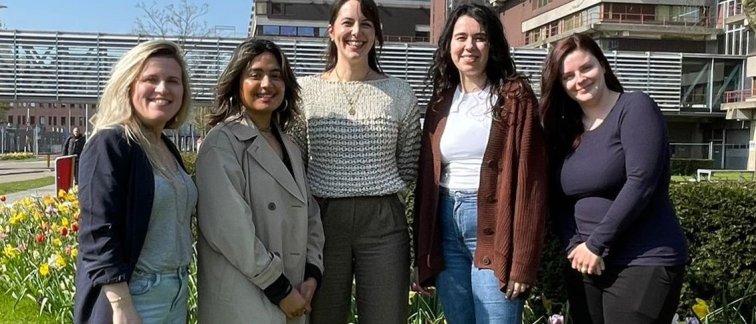This week, the manuscript “Berbamine suppresses intestinal SARS-CoV-2 infection via a BNIP3-dependent autophagy blockade”, led by Dr. Carla Ribeiro of the Amsterdam UMC, was published in the renowned journal Emerging Microbes & Infections.
This COVID-19 project was co-funded by the Amsterdam institute for Infection and Immunity, and involved a transatlantic collaboration between Amsterdam UMC research groups with the lab of Dr. François Jean at the University of British Columbia (UBC, Canada). Funding was also provided by the Coronavirus Variants Rapid Response Network (CoVaRR-Net), of which Dr. Jean leads the Antiviral Strategies and Antiviral Therapeutics Pillar.
This research project identifies berbamine dihydrochloride as a potent inhibitor of SARS-CoV-2 entry and replication in human intestinal epithelial cells. Excitingly, berbamine displayed pan-SARS-CoV-2 antiviral activity by targeting machinery of the host autophagy pathway, including a striking nanomolar potency against SARS-CoV-2 Omicron subvariants. This work demonstrates that berbamine, a molecule derived from traditional Chinese medicinal herbs and under investigation for its anti-cancer properties, is a promising option for a cost-effective, over-the-counter antiviral that could be fast-tracked to reach COVID-19 patients.
Currently, COVID-19 is understood as a multi-organ disease, which causes not only respiratory distress, but also extrapulmonary manifestations such as intestinal inflammation and damage in patients. This paper provides the first evidence for a host-directed therapeutic that could potentially limit these intestinal symptoms of COVID-19. Carla Ribeiro elaborates, “This work builds upon our own previous work with HIV-1 [1,2], as well as other work of the Jean group at UBC that identifies promising host-directed antivirals for SARS-CoV-2 therapy [3, 4]. Our manuscript underscores the relevancy of host autophagy pathways that the virus utilizes to sneak into the human intestine and cause tissue damage. We envision that investigation into host-directed, autophagy-targeting therapeutics has the potential to expand our current toolkits, and improve our preparedness to combat current and emerging human viral diseases.”

Alexandra Cloherty, one of the lead authors of the manuscript: “This work provides exciting mechanistic insights into the antiviral functioning of berbamine, and underlines the relevancy of using autophagy-targeting antivirals. Host-directed therapies like these are an exciting alternative to direct-acting antivirals, because they are able to boost cell-intrinsic antiviral defenses with a low likelihood of the development of drug resistance.”
As well as providing a proof of concept for the potential for targeting host autophagy machinery in order to thwart viral infection, this project also utilizes a highly physiologically relevant model, namely a primary human 2D intestinal epithelial organoid infection model. Anusca Rader, one of the lead authors of the study, spent the first years of her PhD co-developing this infection model. She explains, “This model permitted us to perform pre-clinical drug screens that assess not only SARS-CoV-2 infection, but also the impact of intestinal SARS-CoV-2 exposure on gut barrier dysfunction, which is now known to be a key symptom in post-COVID-19 syndrome.”
Ribeiro Lab is now focusing on enhancing the complexity of these 2D organoid model through co-culture with relevant immune cells to recapitulate host-microbe-immune interactions during infection and pathogenesis of not only SARS-CoV-2, but also other viruses that target the human intestine.
For more information contact Carla Ribeiro or read the scientific publication.
Picture: Ribeiro Lab, Amsterdam UMC. From left to right: Carla Ribeiro, Kharishma Patel, Alex Cloherty, Anusca Rader, Renee Schreurs.
Read our previously published articles about infectious diseases here:
References
[1] Cloherty, A.P.M., van Teijlingen, N.H., Eisden, TJ.T.H.D.et al.Autophagy-enhancing drugs limit mucosal HIV-1 acquisition and suppress viral replication ex vivo.Sci Rep 11, 4767 (2021). https://doi.org/10.1038/s41598-021-84081-4
[2] Ribeiro, C., Sarrami-Forooshani, R., Setiawan, L.et al.Receptor usage dictates HIV-1 restriction by human TRIM5α in dendritic cell subsets.Nature 540, 448–452 (2016). https://doi.org/10.1038/nature20567
[3] Shapira, T., Monreal, I.A., Dion, S.P.et al.A TMPRSS2 inhibitor acts as a pan-SARS-CoV-2 prophylactic and therapeutic.Nature 605, 340–348 (2022). https://doi.org/10.1038/s41586-022-04661-w
[4] Pérez-Vargas, J, Shapira, T., Olmstead, A.D. et al Discovery of lead natural products for developing pan-SARS -CoV-2 therapeutics, Antiviral Research 209, 1-13 (2023)
https://doi.org/10.1016/j.antiviral.2022.105484

